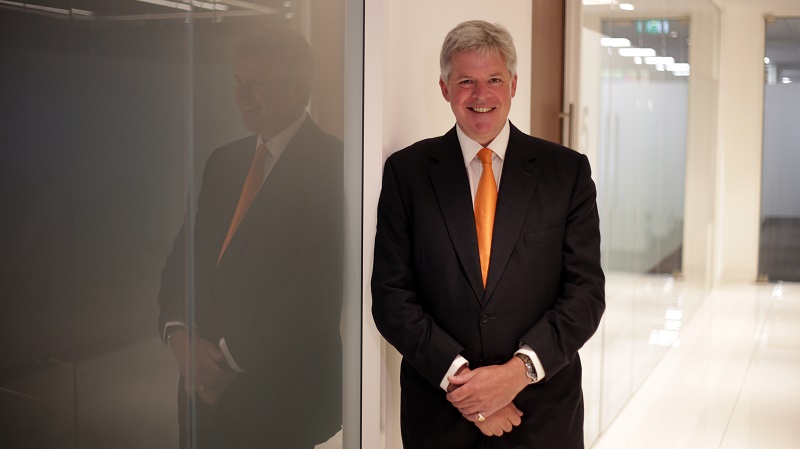The past year was trying for the UK arm of Raymond James, given the global pandemic ripped through financial markets. But head of business development Anthony Scott is buoyant having taken seven wealth managers under the firm’s wing in the past 18 months.
In fact, it’s been an eventful four years since Scott joined the firm in June 2017 to head up its commercial operations, and in that time assets under management have gone from a little over £7bn to £13.6bn at the end of March.
Scott describes Raymond James as “pretty conservative” and yet it has grown “quickly in a relatively controlled way” since he joined from Charles Stanley, where he spent 17 years, initially as a private client investment manager. Before that, he worked in Asia for the Swire Group as a commercial and marketing manager, and that followed a stint in the British Army, where he was a captain.
At Raymond James, Scott is responsible for business development strategy. His department identifies growth opportunities and works to expand the number of wealth managers under the firm’s banner. During the past year alone, Raymond James has established seven wealth management branches around the country, which is no mean feat considering the inability to meet face to face for a good chunk of that time.
Affiliation model
Scott believes Raymond James is different to most wealth managers because it regards its affiliate investment managers as clients.
“I remember when I first came here, I was interviewing as a prospective investment manager. It was only halfway through the meeting I realised when they were talking about a ‘client’ they were referring to me,” he says.
The Raymond James model hinges on four levels of affiliation with its underlying firms. The first, which accounts for the bulk of the business, is made up of the independent contractors, which are branches underneath the Raymond James umbrella for which it looks after compliance as well as dealing systems.
Then there is the professional partner model, which is similar to independent contractors but instead of the relationship being with the branch principal or the investment manager, it might be with an accountant or a firm of lawyers.
Third are platform clients that have their own Financial Conduct Authority authorisation and look after the compliance and regulatory side of the business, with Raymond James providing custody and execution for the underlying clients.
Last month, the firm added a fourth option – ’employee affiliation model’ – which allows its UK wealth manager affiliates to join as full employees. Under the arrangement, wealth managers have the freedom to build their own book of clients free of restrictive covenants and have autonomy over the investments and advice they give, all while picking up a salary and being set up in an office by Raymond James.
When individuals join Raymond James as independent contractors, the firm can lend them money to get their business o the ground and if necessary for acquisitions further down the line, as well as regulatory cover.
“We provide them with an awful lot of resources in terms of making sure they’ve got the systems, tools and everything they need to set up their business,” Scott says.
The team spends a lot of time conducting due diligence with prospective investment managers but, as Scott explains, this is a two-way process as it is as much about helping the client do checks and balances on Raymond James. In some cases, this back and forth can take years and can ultimately end with a no.
“We’re looking for people whose current basis is effectively UK retail; pretty vanilla. So if you’re talking about trading options or the more exotic end of the spectrum, it’s just not where we are,” Scott explains.
“There’s a big enough market for us to help here and we like to sleep well at night, so therefore we know the area we play in and we know it well.”
He says not long after joining the firm he had to say no to somebody who had spent six years talking with Raymond James, because the fit was not quite right. “It was a really tough call. But if you don’t do that you end up with somebody who has problems because they’re pushing the envelope a bit.”
The key for Raymond James, he adds, is building long-term relationships and by looking after its investment managers it is, by extension, looking after the end client. Investment managers are not bound to a central buy list or investment strategy, although they do have to submit a strategy on joining the firm that Raymond James signs off. Again, this needs to be plain vanilla in order to pass the test.
“The price of independence is eternal vigilance,” Scott adds. “If you look at our market the trend is very much towards, for want of a better word, commoditisation, ie central models, central buy lists, etc. A lot of people who come to us are independently minded and don’t want to be pigeonholed.”
He adds: “An investment manager is saying, ‘This is what I plan on doing’ and we are holding them to account. It’s a friendly conversation, it’s not beating them over the head because they’ve gone away from what they originally said.
“It’s more, ‘You’re drifting slightly away from what you said you were going to do, you might want to make sure there a good reason for it’.”
The firm doesn’t put restrictive covenants in place with its investment managers, meaning if things are not working out they can walk away with their clients unencumbered.
“If they want to leave us, they give us three months’ notice and we’ll help them move on to the next place,” he says, “If you’re thinking of moving or if you’ve made a mistake, we’ll help you move, you don’t get tied in.”
Surely there must be a catch.
“We’re here to provide the service to them and, yes, we do charge for it,” says Scott. “We are competitive, but I think if you look at some of the bigger competitors out there and the pressure they’re under to achieve profit margins, and you compare it with our parent in the States, this is a fabulous time for growth.
“We’ve been profitable for many years now, but we’re not as ambitious in those terms and that allows us to pass it through. So, is there a catch? Genuinely there isn’t.”
When individuals or businesses join Raymond James they undergo a roleplay and assessment exercise which involves a mock client take-on to make sure they have the necessary experience.
The seven branches established over the past year have been in Wanstead in east London; Watford; Manchester; City of London; Liverpool; Kendal in Cumbria; and Bramham in West Yorkshire.
Scott explains those individuals who set up branches under the Raymond James umbrella are often entrepreneurial people who have become disillusioned and tied down working within larger organisations and want to run their own businesses.
“They’ve got to be reasonably entrepreneurial people to want to come to us because they are running their own business, albeit under our umbrella as a branch of ours,” he adds. “We make it as unscary as we can, but it takes a relatively brave person to do that.”
Home from home
Talking of scary, Scott says the FTSE dropping to 5,000 last March was unsettling but the move to remote working since the pandemic hit has not had a significant impact on the business.
Alongside chief executive Peter Moores and head of relationship management Cynthia Poole, Scott has been keeping in touch with offices through regular remote “fireside chat” sessions and most have said they didn’t notice the difference when the firm moved to home working. In fact, Scott says the relationship with clients has “been as good as ever”
“We work in an industry that is very people-driven,” he adds. “Relationships are everything. We are trusted with the most remarkable responsibility of looking after the underlying clients’ assets, and our clients, our investment managers.”
The past year has not come without its unnerving moments, of course, but Scott feels the firm was able to use it as an opportunity to guide end clients through financial issues.
“Certainly, the first and second lockdowns were fairly scary. It causes people to worry and it’s important that we, and the investment managers who work with us, are able to talk to their clients. So if anything it has probably brought people closer.”
The pandemic has also aided new business due to it prompting people with suddenly more time on their hands to think about their financial affairs.
“You’re sitting at home, you haven’t got a lot to do, you may not be working, you may be retired, whatever it is, but you can’t go out and that is pause for thought,” he says. “People might be thinking about inheritance, about school fees, or they may have children who need help. Zoom has been brilliant – it’s amazing how people have adapted to it.”
Is a return to the office environment on the cards? “We’re moving carefully,” says Scott. “Will it change what we do in the future? I don’t think we’re any different to anyone else. We’re certainly looking at having more flexible working practices but it’s got to be right for the role and Covid has proved it can be done pretty effectively.”
“There is a cultural necessity too for people to meet face to face but does it have to be five days a week? No, it probably doesn’t.”
This article first appeared in the June 2021 issue of Portfolio Adviser.







